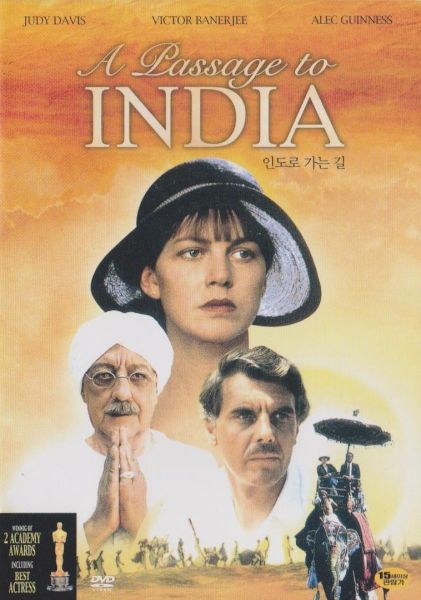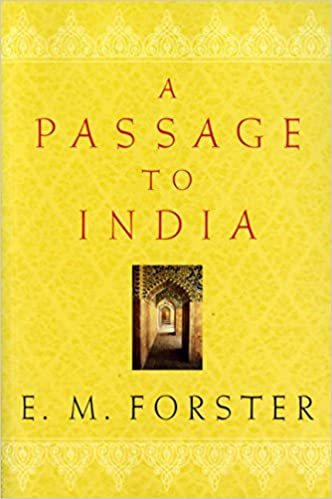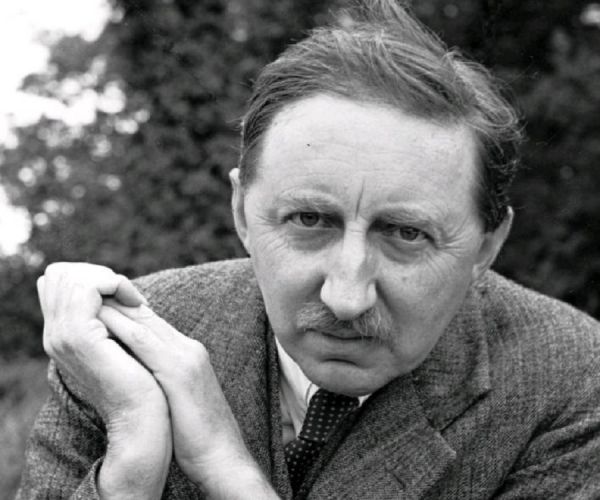A Passage to India--Prelude to Civil War and Division

In 1984, I went with a group to see A Passage to India, starring Alec Guinness, James Fox, and Peggy Ashcroft—based on the book by British novelist E. M. Forster, who published it in 1924. Guinness and Ashcroft were already long past their prime. Guinness had first appeared in the 1946 movie, Great Expectations, based on the novel by Charles Dickens. Ashcroft first appeared in Alfred Hitchcock's The 39 Steps from 1935. Even James Fox appears too old to play Cyril Fielding; but what they lack in youth, they more than make up with relaxed professionalism.

Except for our group, the movie theatre was almost empty, which says a lot about the loss of recognition-value for Forster's work. I had majored in literature in college and may have heard his name mentioned in passing, as an influence for later writers, or for his contributions to the development of the novel-genre. That was all. I had not read a single book of his and would not have recognized their titles.

So this filming of Passage to India and the subsequent filming of A Room with a View and Howard's End gave Forster's reputation a needed boost, and led to the publication of new editions of his works. Sometimes movies have that effect. In the case of Bernard Malamud, for example, the filming of his The Natural, starring Robert Redford, started a new recognition of his works—the same with Saul Bellow and the filming of his novel Seize the Day, starring the late Robin Williams. I only wish Hollywood produced more movies that promote important books.
Passage is simply one of the best novels I have ever read; but like any really good novel, it needs a mini-series that gives it enough time to unfold fully and to exhibit its inherent strengths. A mini-series can take its time to allow a viewer to understand the artful complexity of the plot and th characters. They accumulate social interactions over the course of the plot. enriching a viewer's understanding and sympathy for them.
The screen-play for the movie version of Passage was written by the Indian Santha Rama Rau. She makes the story one-dimensionally pro-Indian. Interestingly, Rama Rau preferred living in the United States, rather than her native India, suggesting that she over-compensated for the conflict caused by her divided loyalties.
At any rate, her screen-play works well enough, so that if you ask most people to say something about the Passage to India movie, they will say it concerns White racism and the Indian independence movement. They will also say that it concerns an Indian-Muslim man who goes on trial for raping an Englishwoman, more or less the same plot-line as To Kill a Mockingbird, published nearly forty years later. That makes it simple enough for busy people to grasp.
My own take is that Passage explores the durability of human relationships, across cultural gulfs. between Indians and Britons, between government officials and private citizens, and finally, of course, between people of different races and religions. Rama Rau neglects the racial tension amongst the Indians, themselves, which plays a prominent part in the novel.
Forster created a fictional city for Passage, "Chandrapore", where both Muslims and Hindus live. The many relationships demonstrate the animosity between them; so that the story does not concern just the enmity between whites and Indians, or Indians and their colonial overseers—but spans a larger range of human issues, a more complex subject than Rama Rau cared to know.
About Chandrapore, Forster writes that
It trails for a couple of miles along the bank (of the Ganges), scarcely distinguishable from the rubbish it deposits so freely. . . . The streets are mean, the temples ineffective . . . houses are hidden away in gardens or down alleys whose filth deters all but the invited guest. . . . Houses do fall, people are drowned and left rotting . . . like some low but indestructible form of life.”
Since Passage concerns the burgeoning independence movement, Forster's setting is of major concern. The idea of independence may inspire revolutionaries to take up the sword and lead the fight, but it also means that any problem faced by British India will also haunt an independent India. Let us say, Forster presents India in transition, which gives it a special distinction.
And not just because of its independence movement. Forster also describes the early stage of the nascent religious conflict, which would lead to a civil war, cost India at least a million lives, and lead to the break-up of British India into four new nations—India, Bangladesh, Pakistan, and Sri Lanka.
In one remarkable scene, the main character in Passage, a Muslim doctor named Aziz has to miss a few days at work after he drinks unclean water and contracts fever. Colleagues from his medical practice and his friends in the government, both Muslim and Hindu, call on Aziz to wish him a speedy recovery. They end up in a petty, partisan quarrel, with some intimations about what will happen in the future.
When Aziz's guests inform him that a prominent Brahmin has diarrhea, the Muslims worry instantly about an epidemic. “Before long, they began to condemn (the Brahmin) as a source of infection.” One Muslim contends, “All illness proceeds from the Hindus.” At Muslim conferences, they dismissed the Hindus “with biting scorn.”
Forster probes the mind of Aziz daringly and poetically, something no other author has done:
Aziz liked to hear his religion praised. It soothed the surface of his mind, and allowed beautiful images to form beneath. . . . Not as a call to battle, but as a calm assurance came the feeling that India was one; Moslem; always had been; an assurance that lasted until they looked out the door. . . .
. . . And the sister kingdoms of the north—Arabia, Persia, Fergana Uzbekistan), Turkestan—stretched out their hand as (the Muslim poet Ghalib) sang, sadly, because all beauty is sad, and greeted ridiculous Chandrapore, where every street was divided against itself, and told her she was a continent and a unity.
Note carefully the line "a calm assurance that India was one. Moslem," and the previous quote "All illness proceeds from the Hindus," and recognize that there is little sense trying to talk religious tolerance to these people. Aziz's visitors show fierce religious partisanship all around. Too bad no one in the British hierarchy paid any attention to A Passage to India. They just ignored the growing conflict—present even at this early date, 1924.
Forster continues:
Of the company (Aziz's visitors) only Hamidullah had any comprehension of poetry. The minds of the others were inferior and rough. . . . Hamidullah had called in on his way to a worrying committee of notables, nationalist in tendency, where Hindus, Moslems, Sikhs, Parsis, a Jain, and a Native Christian tried to like one another more than came natural to them. As long as someone abused the English, all went well, but nothing constructive had been achieved, and if the English were to leave India, the committee would vanish also.
The arrival of Aziz's doctor Dr. Panna Lal, a Hindu, “driven by the horrid Mr. Ram Chand” brought home the magnitude of India's problems for everyone to see. Forster describes Ram Chand as someone “desirous of fomenting trouble.” The schoolboy Rafi provides the diverse group its flash-point:
“There is no reason you should bring a charge against a doctor,” said Ram Chand.
“Exactly, Exactly,” agreed Hamidullah, anxious to avoid an unpleasantness. Quarrels spread so quickly. . . .
“It is only a boy,” said Dr. Panna Lal, appeased.
“Even boys must learn,” said Ram Chand.
“Your own son failing to pass the lowest standard, I think,” said Syed Mohammed suddenly.
“Oh, indeed? Oh yes, perhaps. He has not the advantage of a relative in the Prosperity Printing Press.”
“Nor you the advantage of conducting their cases in the courts, any longer.”
Their voices rose. They attacked one another with obscure allusions and had a silly quarrel.
At the end of Passage to India, even Fielding and his old friend Aziz quarrel over India's future. Aziz wants the British to leave and give India its independence, while Fielding is disgusted that Aziz cannot see the looming conflict in a nation with such different religious and ethnic prejudices and rivalries.
After the British leave, Aziz says, they can become friends again. Fielding replies, “Why can't we be friends now?” He explains, “It's what I want. It's what you want.”
Forster concludes the novel with a rude truth—beautifully subjective language, the best in the business:
But the horses didn't want it—they swerved apart; the earth didn't want it, sending up rocks through which the riders must pass. . . . the temples, the tank, the jail, the birds . . . they didn't want it, they said in their hundred voices, “No, not yet,” and the sky said, “No, not there.”
I think of all the name-calling in our nation, the U.S., the attacks on reputations, and although they sound like tempests in tea-cups, the same could be said about the petty quarrels in Aziz's home. They may have started as petty quarrels, but, as Hamidullah said, quarrels spread so quickly, like cases of diarrhea.



